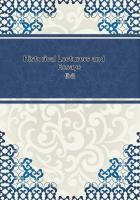"Avast heavin', Isaiah!" put in Captain Shadrach. "You're way off your course. Zoeth never said that. That's the way I talk, but he don't."
"He done it this time," persisted Isaiah. "I turned and looked through the doorway at him and he was standin' in the middle of the kitchen floor. Seems to me he had a piece of white paper in his hand--seem's if he did. And then, afore I could say a word, he kind of groaned and sunk down in--in a pile, as you might say, right on the floor. And I couldn't get him up, nor get him to speak to me, nor nothin'. Yet he must have come to enough to move after I left and to crawl acrost and lean against that chair."
The horse liniment circular and the Wellmouth Register were there on the kitchen table just where Mr. Hamilton had laid them. There, also, were the two letters addressed to Hamilton and Company. Of the letter which Isaiah seemed to remember as addressed to Zoeth personally, there was no sign.
"Are you sure there was such a letter, Isaiah?" asked Mary.
Mr. Chase was not sure; that is to say, he was not sure more than a minute at a time. The minute following he was inclined to think he might have been mistaken, perhaps it was yesterday or the day before or even last week that his employer received such a letter.
Captain Shadrach lost patience.
"Sure 'twan't last Thanksgivin'?" he demanded. "Are you sure about anything? Are you sure how old you are?"
"No, by godfreys, I ain't!" roared Isaiah in desperation. "I'm so upsot ever since I looked into that kitchen and see the poor soul down on the floor there that--that all I'm sure of is that I ain't sure of nothin'"
"Well, I don't know's I blame you much, Isaiah," grunted the Captain. "Anyway, it doesn't make much difference about that letter, so fur as I see, whether there was one or not. What did you want to know for, Mary?"
Mary hesitated. "Why," she answered, "I--perhaps it is foolish, but the doctor said something about a shock being responsible for this dreadful thing and I didn't know--I thought perhaps there might have been something in that letter which shocked or alarmed Uncle Zoeth.
Of course it isn't probable that there was."
Shadrach shook his head.
"I guess not," he said. "I can't think of any letter he'd get of that kind. There's nobody to write it. He ain't got any relations nigher than third cousin, Zoeth ain't. Anyhow, we mustn't stop to guess riddles now. I'll hunt up the letter by and by, if there was one and I happen to think of it. Now I've got to hunt up a nurse."
The nurse was found, a Mrs. Deborah Atkins, of Ostable, and she arrived that night, bag and baggage, and took charge of the patient.
Deborah was not ornamental, being elderly and, as Captain Shadrach said, built for tonnage more than speed; but she was sensible and capable. Also, her fee was not excessive, although that was by no means the principal reason for her selection.
"Never mind what it costs," said Mary. "Get the best you can. It's for Uncle Zoeth, remember."
Shadrach's voice shook a little as he answered.
"I ain't likely to forget," he said. "Zoeth and I've cruised together for a good many years and if one of us has to go under I'd rather 'twas me. I haven't got much money but what I've got is his, and after that so long as I can get trusted. But there," with an attempt at optimism, "don't you fret, Mary-'Gusta. Nobody's goin' under yet. We'll have Zoeth up on deck doin' the fishers' hornpipe in a couple of weeks."
But it was soon plain to everyone, the Captain included, that many times two weeks must elapse before Mr. Hamilton would be able to appear on deck again, to say nothing of dancing hornpipes. For days he lay in partial coma, rallying occasionally and speaking at rare intervals but evidently never fully aware of where he was and what had happened.
"He will recover, I think," said the doctor, "but it will be a slow job."
Mary did not again refer to the letter regarding which Isaiah's memory was so befogged. In fact, she forgot it entirely. So also did Captain Shad. For both the worry of Zoeth's illness and the care of the store were sufficient to drive trifles from their minds.
And for Mary there was another trouble, one which she must keep to herself. Three weeks had elapsed since Crawford's letter, that telling of his two fateful interviews with his father, and still no word had come from him. Mary could not understand his silence. In vain she called her philosophy to her rescue, striving to think that after all it was best if she never heard from him again, best that a love affair which could never end happily were ended at once, best that he should come to see the question as his father saw it--best for him, that is, for his future would then be one of ease and happiness. All this she thought--and then found herself wondering why he had not written, imagining all sorts of direful happenings and feeling herself responsible.















